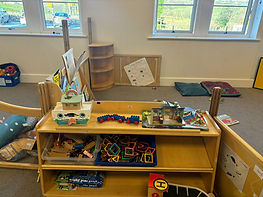

Villages Pre-School Eldwick
Red Zone
Our Red Zone is home to our youngest children
This is our Red Area, specially designed for our youngest learners — our curious 1 to 2-year-olds. Here, we focus on the three prime areas of the Early Years Foundation Stage: Communication and Language, Physical Development, and Personal, Social and Emotional Development. We aim to build secure attachments with children, support emotional regulation and encourage positive social interactions. We do this through games such as peek-a-boo, promoting joint attention skills and eye-contact, smiles and developing a strong relationship.
Consistent routines are so important and help children feel safe and secure.
We respond to children’s individual needs, providing comfort, reassurance so children feel heard, cared for and comfortable. We model positive interactions with other adults and children which can help children understand social norms.
Everything in this space is set up to nurture those essential first skills — from sensory play to early social interaction and movement. Our goal is to create a safe, nurturing environment where children feel confident to explore and express themselves."
Physical Development: outside stepping stones, bikes, climbing wall, inside – tunnel, dancing, soft balls, tactile disks
Communication Language and Literacy: stories, songs, conversations, target vocab, listening games. We encourage communication through singing action songs and familiar rhymes. We ensure children are listened to. We encourage a love of reading through…….we target new vocabulary
Visual aids support understanding of the steps involved in processes such as hand washing.
Role-play opportunities provide symbolic play, including feeding the teddy a cup of tea.
Textural exploration is important to young children – we have water and sand play, along with cornflour, coloured rice and soft pom poms, help children be inquisitive.
Personal Social and Emotional Development : mirrors, books, talking about feelings, puppets, role play, story sacks, music bag. We label emotions children are experiencing. Children can bring in transitional objects to help them settle. Children typically engage in solitary play, moving into parallel play (alongside another child) and we encourage this through providing resources that can be shared, such as building a tower or rolling balls to each other, supported by adults. We introduce turn-taking by saying ‘my turn’ and ‘your turn’ as we model this skill.
Nursery rhyme games, welcome song, action songs, key book of the week, routines, play doh and disco.
Characteristics of effective learning are so important to develop, from a young age. We aim to encourage children to ‘have a go’ at different activities and participate in different experiences.



